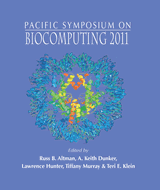Identification of Aberrant Pathway and Network Activity from High-Throughput Data
M. Ochs1, R. Karchin2, H. Ressom3, R. Gentleman4
1Departments of Oncology and Health Science Informatics, Johns Hopkins University, Baltimore, MD 19075, USA; 2Department of Biomedical Engineering and Institute for Computational Medicine, Johns Hopkins University, Baltimore, MD 21218, USA; 3Department of Oncology, Lombardi Comprehensive Cancer Center, Georgetown University Washington, DC 20057, USA; 4Boinformatics and Computational Biology, Genentech South San Francisco, CA 94080, USA;
Email: mfo@jhu.edu
Pacific Symposium on Biocomputing 16:364-368(2011)

Abstract
The workshop focused on approaches to deduce changes in biological activity in cellular pathways and networks that drive phenotype from high-throughput data. Work in cancer has demonstrated conclusively that cancer etiology is driven not by single gene mutation or expression change, but by coordinated changes in multiple signaling pathways. These pathway changes involve di erent genes in di erent individuals, leading to the failure of gene-focused analysis to identify the full range of mutations or expression changes driving cancer development. There is also evidence that metabolic pathways rather than individual genes play the critical role in a number of metabolic diseases. Tools to look at pathways and networks are needed to improve our understanding of disease and to improve our ability to target therapeutics at appropriate points in these pathways.
[Full-Text PDF] [PSB Home Page]